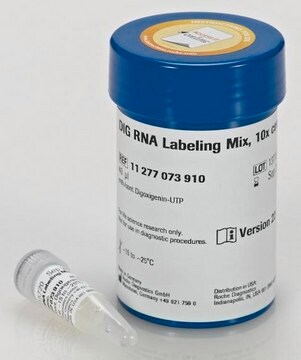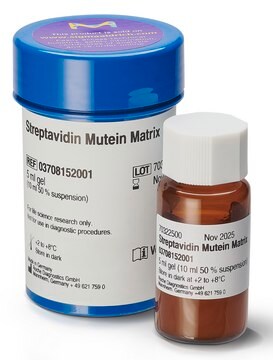11685597910
Roche
Biotin RNA Labeling Mix
sufficient for 20 reactions (transcription), pkg of 40 μL, solution
Synonyme(s) :
Biotin
Se connecterpour consulter vos tarifs contractuels et ceux de votre entreprise/organisme
About This Item
Code UNSPSC :
41105500
Produits recommandés
Forme
solution
Niveau de qualité
Utilisation
sufficient for 20 reactions (transcription)
Conditionnement
pkg of 40 μL
Fabricant/nom de marque
Roche
Impuretés
Ribonuclease, none detected
Couleur
colorless
Solubilité
water: miscible
Température de stockage
−20°C
Description générale
Convenient nucleotide mixture for the labeling of RNA with Biotin-16-UTP.
Spécificité
Heat inactivation: Stop the reaction by adding 2 μl 0.2 M EDTA (pH 8.0).
Application
Biotin RNA Labeling Mix has been used for RNA labeling with Biotin-16-UTP by in vitro transcription with SP6, T7, and T3 RNA polymerases.
Biotin-labeled RNA is also used in a variety of hybridization techniques:
Biotin-labeled RNA is also used in a variety of hybridization techniques:
- Southern blots
- Northern blots
- Dot blots
- Plaque or colony lifts
- RNase protection experiments
- In situ hybridizations
- Microarray hybridizations
- RNA pull down assay
Caractéristiques et avantages
Contents
10x concentrated solution with: 10mM each ATP, CTP, GTP, 6.5mM UTP, 3.5mM Biotin-16-UTP, pH 7.5
10x concentrated solution with: 10mM each ATP, CTP, GTP, 6.5mM UTP, 3.5mM Biotin-16-UTP, pH 7.5
Qualité
Function tested in combination with the DIG RNA Labeling Kit.
Principe
Biotin-labeled, single-stranded RNA probes of defined length are generated by in vitro transcription. Biotin-16-UTP is incorporated by SP6, T7, and T3 RNA polymerases at approximately every 20 to 25th nucleotide of the transcript under the conditions described below. The Biotin RNA Labeling Mix is specifically designed for the use with Roche SP6,T7, and T3 RNA Polymerases, which are supplied with an optimized transcription buffer.
Notes préparatoires
Assay Time: 135 minutes
Sample Materials
Sample Materials
- Linearized plasmid DNA: The DNA to be transcribed is cloned into the polylinker site of an appropriate transcription vector which contains adjacent to the polylinker a promoter for SP6, T7 or T3 RNA polymerase. For the synthesis of ′run off′ transcripts the plasmid is linearized by a restriction enzyme. Restriction enzymes creating 5′-overhangs should be used; 3′ overhangs should be avoided. The linearized template DNA should be purified by phenolchloroform extraction and ethanol precipitation, to avoid RNase contamination. For ′run around′ transcription circular plasmid DNA is used.
- PCR product: PCR-fragments which contain RNA polymerase promoter sequences can also act as templates for transcription. Purification of the correct PCR fragment by gel electrophoresis prior to transcription is recommended.
- Labeling Efficiency :A standard labeling reaction with 1μg linear template DNA and an RNA polymerase produces approx. 10μg of full-length, biotin-labeled RNA. In a spot test, a combination of anti-biotin-AP and the chemiluminescence substrate CSPD can detect as little as 0.3pg of the biotin-labeled RNA.
Autres remarques
For life science research only. Not for use in diagnostic procedures.
Classe de danger pour l'eau (WGK)
WGK 1
Point d'éclair (°F)
does not flash
Point d'éclair (°C)
does not flash
Certificats d'analyse (COA)
Recherchez un Certificats d'analyse (COA) en saisissant le numéro de lot du produit. Les numéros de lot figurent sur l'étiquette du produit après les mots "Lot" ou "Batch".
Déjà en possession de ce produit ?
Retrouvez la documentation relative aux produits que vous avez récemment achetés dans la Bibliothèque de documents.
Les clients ont également consulté
Oskar Marín-Béjar et al.
Methods in molecular biology (Clifton, N.J.), 1206, 87-95 (2014-09-23)
Recent advances in genomics have revealed that cells encode thousands of noncoding RNA molecules that do not require translation to proteins to perform their biological roles. Although very little is known about the mechanisms of function of noncoding RNAs, these
Andrea Bleckmann et al.
Methods (San Diego, Calif.), 98, 66-73 (2015-11-03)
First evidence on gene function and regulation is provided by the cellular expression pattern in complex tissues. However, to understand the activity of a specific gene, it is essential to analyze the regulatory network, which controls the spatio-temporal translation pattern
Fei Wang et al.
Cell death and differentiation, 28(9), 2634-2650 (2021-03-26)
The brain is known to express many long noncoding RNAs (lncRNAs); however, whether and how these lncRNAs function in modulating synaptic stability remains unclear. Here, we report a cerebellum highly expressed lncRNA, Synage, regulating synaptic stability via at least two
Henrik Lindehell et al.
Chromosoma, 124(3), 385-395 (2015-02-20)
In Drosophila, the male-specific lethal (MSL) complex specifically targets the male X chromosome and participates in a twofold increase in expression output leading to functional dosage compensation. The complex includes five proteins and two non-coding RNAs (ncRNAs). A number of
Bing Chen et al.
Scientific reports, 6, 23330-23330 (2016-03-22)
An increasing number of long noncoding RNAs (lncRNAs) have been discovered with the recent advances in RNA-sequencing technologies. lncRNAs play key roles across diverse biological processes, and are involved in developmental regulation. However, knowledge about how the genome-wide expression of
Notre équipe de scientifiques dispose d'une expérience dans tous les secteurs de la recherche, notamment en sciences de la vie, science des matériaux, synthèse chimique, chromatographie, analyse et dans de nombreux autres domaines..
Contacter notre Service technique





